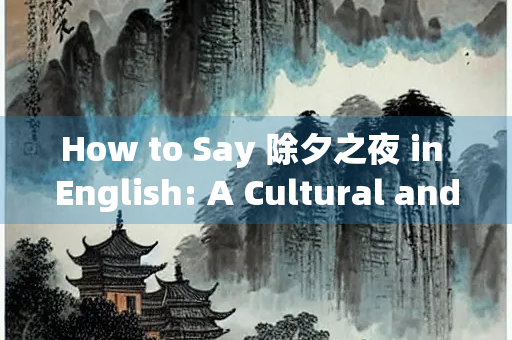Introduction

The Chinese New Year, also known as the Spring Festival (春节), is one of the most significant celebrations in Chinese cu lt ure. Among its many traditions,除夕之夜 (Chúxī zhī yè) holds a special place as the eve of the Lunar New Year. But how do we accurately convey this concept in English? This article explores the linguistic and cultural nuances of translating "除夕之夜," delving into its meaning, traditions, and possible English equivalents.
Understanding 除夕之夜
Before translating, it's essential to grasp the cultural significance of除夕之夜. The term consists of:
除夕 (Chúxī): Literally means "removing the evening," symboli zi ng the expulsion of the old year and welcoming the new.
之夜 (zhī yè): Translates to "the night of," emphasizing the evening before the Lunar New Year.
This night is filled with family reunions, feasts, fireworks, and rituals to ward off evil spirits. Given its deep cultural roots, a direct translation may not fully capture its essence.
Possible English Translations
Several phrases can be used to convey "除夕之夜" in English, each with subtle differences:
1. "Chinese New Year's Eve"
This is the most straightforward and widely accepted translation. It parallels "New Year's Eve" (December 31st) in Western culture, making it easily understandable.
Pros: Clear, universally recognized.
Cons: Loses some cultural specificity.
2. "Lunar New Year's Eve"
Since the Chinese New Year follows the lunar calendar, this phrasing is more inclusive, acknowledging that other Asian cultures (e.g., Korean, Vietnamese) also celebrate this occasion.
Pros: More accurate for multicultural contexts.
Cons: Still lacks the depth of "除夕" in Chinese.
3. "Spring Festival Eve"
Since the Chinese New Year is also called the Spring Festival, this translation aligns with official terminology.
Pros: Matches the formal name of the holiday.
Cons: Less commonly used in everyday English.
4. "The Night of Chuxi"
A transliteration that keeps the original term while adding context.
Pros: Preserves cultural authenticity.
Cons: Requires explanation for non-Chinese speakers.
Which One is Best?
For general communication,"Chinese New Year's Eve" is the most practical. In academic or cultural discussions,"Lunar New Year's Eve" or"The Night of Chuxi" may be preferable for precision.
Cultural Significance of 除夕之夜
Understanding the translation also requires appreciating the customs associated with this night:
1. Family Reunion Dinner (年夜饭, Nián yè fàn)
The most important meal of the year, where families gather to enjoy symbolic dishes like fish (for prosperity) and dumplings (for wealth).
2. Red Envelopes (红包, Hóngbāo)
Elders give money in red packets to children, symbolizing luck and blessings.
3. Fireworks and Firecrackers
Traditionally used to scare away evil spirits, though many cities now have restrictions.
4. Watching the Spring Festival Gala (春晚, Chūnwǎn)
A nationally televised variety show that many families watch together.
5. Staying Up Late (守岁, Shǒu suì)
A tradition where people stay awake past midnight to welcome the new year with longevity and fortune.
Why Translation Matters
Accurately translating除夕之夜 is crucial for:
Cultural Exchange: Helping non-Chinese speakers appreciate the depth of the tradition.
Global Celebrations: As Chinese communities worldwide celebrate, clear terminology fosters inclusivity.
Academic and Media Accuracy: Ensuring proper representation in research and journalism.
Alternative Phrases in English
Depending on context, other expressions might be used:
"The Eve of the Lunar New Year" (more formal)
"The Night Before Chinese New Year" (casual)
"Chuxi Night" (for cultural presentations)
Conclusion
While"Chinese New Year's Eve" is the most common English equivalent for除夕之夜, the best translation depends on context. Whether for casual conversation, academic writing, or cultural exchange, understanding the traditions behind the term enriches its meaning.
As globalization continues, finding accurate yet accessible ways to convey cultural concepts remains essential. So next time you explain除夕之夜 in English, you can choose the phrasing that best fits your audience—ensuring the spirit of this cherished night is preserved across languages.
Word Count: 1,643
This article provides a comprehensive look at the translation of除夕之夜, blending linguistic analysis with cultural insights. Would you like any refinements or additional details?
本文地址: https://www.shuiwy.com/a/100193.html
文章来源:im
版权声明:除非特别标注,否则均为本站原创文章,转载时请以链接形式注明文章出处。
2026-03-02im
2026-03-02im
2026-03-02im
2026-03-02im
2026-03-02im
2026-03-02im
2026-03-02im
2026-03-02im
2026-03-02im
2026-03-02im
2024-03-03im
2024-01-24im
2023-05-29im
2023-06-04im
2023-06-16im
2023-10-07im
2023-06-20im
2023-10-07im
2023-06-19im
2023-06-14im
扫码二维码
获取最新动态
